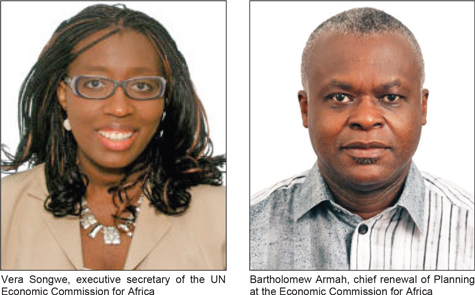Africa Sustainable Development Report Launched During Africa Week
By Jehron Muhammad -Contributing Writer- | Last updated: Nov 9, 2017 - 8:01:06 AMWhat's your opinion on this article?

|
The report uses the latest harmonized data to assess the continent of Africa’s performance with regard to identifying opportunities and challenges and making recommendations to hasten progress. The report, where possible, documents advancements made and lessons learned in tracking progress on Agenda 2063 and its sustainable development goals. Agenda 2063 is a 50-year strategic framework for the social-economic transformation of the continent.
Africa, in spite of recent progress, needs a sustained effort to eradicate extreme poverty and gender inequality and also improve its statistical capabilities to implement and track progress towards its sustainable development goals, the report noted.
The report acknowledges not only is slow progress being made toward reducing poverty and inequality, but rising food insecurity and undernourishment, low agricultural productivity and gender disparities in education and adolescent child births like teenage pregnancies and maternal death are also issues. Also mentioned is the continent’s overall weak infrastructure, limited manufacturing value and limited investment in research.
During a discussion of the report Vera Songwe, executive secretary of the UN Economic Commission for Africa, reacting to the wide-ranging plethora of issues African governments had to address expressed the, “need (for) coordination amongst the targets and between the institutions that are working on these targets.”
She stressed the importance of “collapsing” targets or bridging their similarities, which she said makes it “so much easier for our governments, who are not designed to respond” to the plethora of issues the continent has to deal with.
“So,” she said, in “show(ing) how Africa can come together as one … we don’t necessarily need to be talking about one or the other, but to talk collectively about how we achieve sustainable development goals.”
Bartholomew Armah, chief renewal of Planning at the Economic Commission for Africa discussing the “financial part of it” said, to “implement agendas” some countries “depend on donor support.”
“Donors may be good hearted, well meaning, but that doesn’t necessarily mean their interests and the country in question interest are one in the same. It is a cup in hand kind of thing,” said Mr. Armah.

|
One question only briefly mentioned in the report and missing from the discussion, that could eventually eliminate the continent’s need for donor support, and give it sole control over its development is what is Africa doing to recover the $60 billion in illicit funds that annually leaves the continent, on top of the billions of dollars of raw undervalued extracted minerals?
Another question is why Africa doesn’t receive ample or positive news coverage in the Western press? When the continent receives press it’s droughts, hunger, wars, child soldiers, adolescent marriages, female genital mutilation, etc. Africa represents nearly one-third of the United Nations, the continent represents the majority of the world’s scarce mineral resources, is a continent of nearly one billion people, living in 55 different countries, speaking more than 2,000 languages.
In addition, as a new study by Africa Minds reveals, broken, inadequate relationships between national governments and their local academic communities can undermine independent, democratic policy-making, leaving states as prey to the agendas of foreign powers.
In worst-case scenarios, according to the report, foreign donors, despite so-called best intentions “can take over national policy-making in young democracies,” reported the Mail & Guardian.
The 2017 Africa Sustainable Development report, maybe being aware that vestiges of colonialism still exist, and that all support isn’t altruistic, suggested, “Africa … needs to be more strategic in its cooperation with the rest of the world, ensuring that it draws real benefits from every such initiatives.”
The 2017 report was jointly published by the African Union Commission, the United Nations Economic Commission for Africa, the African Development Bank, and the UN Development Program.
In attendance at launching of the report included: Ambassador Thomas Kwesi Quartley, deputy chairperson of the African Union Commission and executive secretary of the Economic Commission for Africa; Mr. Abdoulaye Mar Dieye, assistant administrator and regional director for Africa at the United Nations Development Program; H.E. Victor Harrison, commissioner for economic affairs, AUC; and Mr. Desire Vencatachellum.
Africa Week, observed October 16-20, kicked off this year with a speech delivered by UN Secretary General Antonio Guterres. During his remarks to the high-level inaugural event at the UN headquarters in New York, he said, “Africa Week is to raise awareness and mobilize support.”
He said Africa is a land of resilience, and above all, it is a land of opportunity. Mr. Guterres highlighted the continent’s recent progress in reducing poverty, diversifying its economies, building the middle class and nurturing growth in a variety of sectors.
Jehron Muhammad is a Final Call contributing writer. Follow him on Twitter @JehronMuhammad.
INSIDE STORIES AND REVIEWS
-
-
About Harriett ... and the Negro Hollywood Road Show
By Rabiah Muhammad, Guest Columnist » Full Story -
Skepticism greets Jay-Z, NFL talk of inspiring change
By Bryan 18X Crawford and Richard B. Muhammad The Final Call Newspaper @TheFinalCall » Full Story -
The painful problem of Black girls and suicide
By Charlene Muhammad -National Correspondent- » Full Story -
Exploitation of Innocence - Report: Perceptions, policies hurting Black girls
By Charlene Muhammad -National Correspondent- » Full Story -
Big Ballin: Big ideas fuel a father’s Big Baller Brand and brash business sense
By Bryan Crawford -Contributing Writer- » Full Story






 Click Here Stay Connected!
Click Here Stay Connected!








